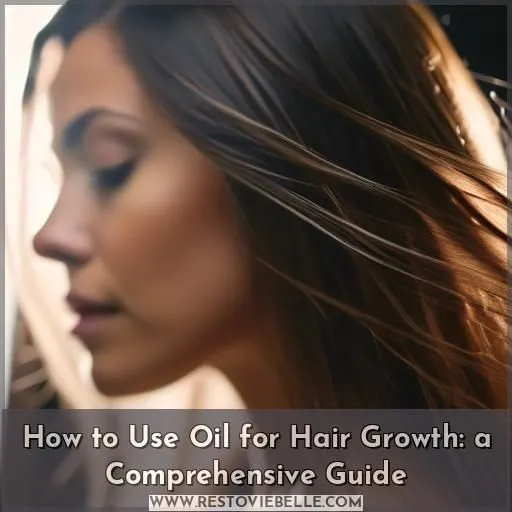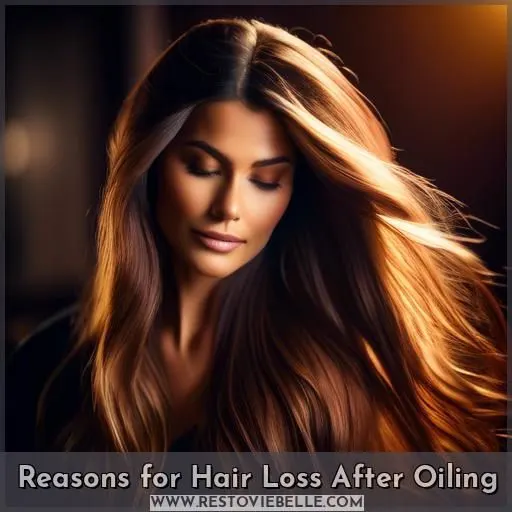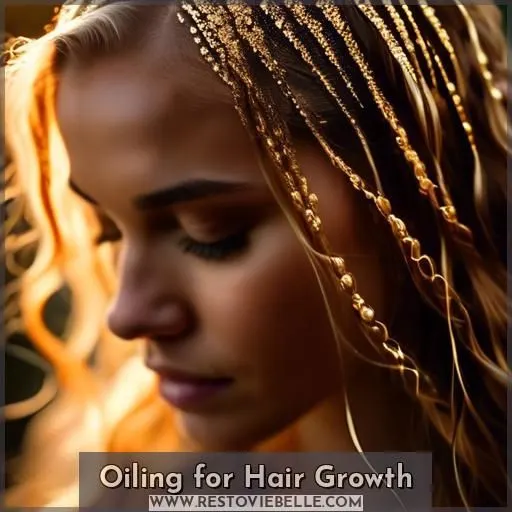This site is supported by our readers. We may earn a commission, at no cost to you, if you purchase through links.
 Unleash the Power of Oil for Hair Growth: A Comprehensive Guide
Unleash the Power of Oil for Hair Growth: A Comprehensive Guide
Oil has long been recognized as a powerful tool for promoting healthy, vibrant hair. From ancient times to modern day, various oils have been used to nourish, strengthen, and stimulate hair growth. In this comprehensive guide, we will explore the benefits of different oils, how to incorporate them into your hair care routine, and tips for maximizing their effectiveness.
Oils such as coconut, argan, and castor oil are renowned for their ability to deeply condition the hair and scalp, providing essential nutrients that can encourage hair growth. These oils are rich in fatty acids, vitamins, and antioxidants that can help to strengthen the hair follicles, reduce inflammation, and improve blood circulation to the scalp.
Applying oils directly to the scalp can help to stimulate the hair follicles, promoting new growth and preventing hair loss. Massaging the scalp with oil can also help to improve blood flow, delivering essential nutrients to the hair roots and encouraging healthy hair development.
When incorporating oils into your hair care routine, it’s important to choose the right oil for your hair type and needs. For example, those with fine or oily hair may prefer a lighter oil like argan or jojoba, while those with dry or damaged hair may benefit more from a heavier oil like coconut or castor.
To maximize the benefits of oil for hair growth, it’s recommended to use a combination of different oils, applying them directly to the scalp and allowing them to penetrate the hair and skin. Regular use of oil treatments, combined with a healthy diet and lifestyle, can help to unlock the full potential of your hair’s growth and vitality.
Table Of Contents
- Key Takeaways
- How to Use Oil for Hair Growth?
- Benefits of Hair Oiling
- Choosing the Right Oil
- How to Apply Oil to Your Hair
- Mistakes to Avoid
- Reasons for Hair Loss After Oiling
- Frequency and Application
- Oiling for Different Hair Types
- Ayurvedic Recommendations
- Tips for Deep Penetration
- Oiling for Hair Growth
- Frequently Asked Questions (FAQs)
- Conclusion
Key Takeaways
- Choose the right oil for your hair type and needs.
- Massage the scalp to stimulate hair follicles and promote growth.
- Apply oil to dry hair for optimal absorption.
- Be consistent with oiling to maintain a healthy hair and scalp.
How to Use Oil for Hair Growth?
To use oil for hair growth, follow these steps:
- Choose the right oil: Argan oil is a popular choice for hair growth due to its nourishing properties and high levels of vitamin E, carotenes, and phenols. Other options include olive oil, castor oil, and jojoba oil.
- Apply the oil: Rub a small amount of oil onto your hands, then massage it into your scalp, focusing on the roots. Work the oil down to the ends of your hair, using your fingers to spread it evenly.
- Let it soak: Allow the oil to sit on your scalp for at least 15 minutes, then shampoo your hair to remove the excess oil.
- Use it regularly: Apply the oil 1-2 times a week, or use a shampoo and conditioner with the oil infused in the formula.
- Try a mask: For a more intensive treatment, mix essential oils like rosemary and peppermint with castor oil, massage it into your scalp, and leave it on for 20-30 minutes before shampooing.
Remember to use only high-quality hair products and maintain a healthy diet rich in plant-based foods, fiber, antioxidants, and protein for optimal hair growth.
Benefits of Hair Oiling
Hair oiling is a great way to give your hair a boost of shine and prevent dandruff.
Enhancing Hair Shine
Dull locks got you down? Turn to moisturizing oils like coconut and argan to amp up the gloss. These hair growth oils are like a secret potion, warding off split ends and taming frizz. A few drops can transform your mane, giving your hair follicles the royal treatment and a dazzling shine.
Preventing Dandruff
Don’t let dandruff dampen your confidence. Oiling your hair is a natural remedy that can help prevent dandruff accumulation. Start by choosing the right oil for your scalp, like coconut or sesame oil. Massage the oil into your scalp, then leave it on overnight.
Remember to avoid common mistakes like combing your hair after oiling or washing it too soon. By incorporating these best practices, you’ll unlock the secrets to a healthy, dandruff-free scalp.
Strengthening Hair Follicles
Strengthening hair follicles is crucial for hair growth and shine. To maximize oil penetration, choose the right oil and massage technique. Essential oil selection can enhance follicle stimulation, while avoiding hair breakage.
Hair oiling can also improve blood circulation and prevent hair loss. Remember, it’s not merely about applying oil, but also about the right technique and frequency.
Choosing the Right Oil
To choose the right oil for your hair, consider your hair type and the desired benefits. Virgin coconut oil is a versatile option suitable for most hair types, while sesame oil excels at reducing frizziness and preventing split ends.
Choose the Right Oil
To choose the right oil for your hair, consider your hair porosity, scalp type, and the oil’s penetration time.
For most hair types, virgin coconut oil is a great option as it penetrates the hair shaft, making it soft and shiny.
Sesame oil is ideal for reducing frizziness and preventing split ends.
Almond oil contains vitamins B, K, and E, which support hair growth.
Jaborandi oil nourishes dry scalps and prevents premature graying.
Argan oil acts as a natural conditioner, strengthening hair.
Massage Scalp
Once you’ve chosen your elixir, be it bhringraj or jaborandi oil, warm it slightly to boost penetration. Gently massage your scalp, ensuring the oil seeps in. Aim for a massage duration that doesn’t just feel heavenly but also promotes oil absorption, scalp health, and ultimately, hair growth.
Leave Overnight
To maximize the benefits of oiling, leave it on overnight. This allows for deep penetration and absorption, enhancing hair growth and shine. Choose the right oil for your hair type, such as sesame oil for frizziness or almond oil for growth.
Remember, oiling frequency should be balanced to avoid overuse and improper rinsing.
How to Apply Oil to Your Hair
Incorporating hair oil into your routine can be a game-changer for your hair’s health and appearance.
- Choose the Right Oil: Select an oil that suits your hair type and concerns. For most hair types, virgin coconut oil is a great choice, as it penetrates the hair shaft. For frizziness and split ends, sesame oil is a good option. If you’re looking for vitamins and minerals to support hair growth, almond oil is a good choice. For dry scalp and premature graying, consider Jaborandi oil, and for a natural conditioner and hair strengthening, opt for Argan oil.
- Massage the Scalp: Apply the oil to your scalp and gently massage it in using the tips of your fingers. This helps to boost blood circulation, leading to hair growth and relaxation.
- Leave Overnight: Apply the remaining oil to your hair and leave it on overnight. This allows the oil to penetrate deeply and be absorbed by your hair.
Remember to avoid common mistakes like combing your hair after oiling, washing it too soon, overusing oil, or tying your hair up too tightly. These can lead to breakage, excess shampoo use, and damage to your hair.
Mistakes to Avoid
Mistakes to Avoid in Hair Oiling
When it comes to hair oiling, there are certain mistakes that can lead to less than desirable results. Here are some common errors to avoid:
- Applying too much oil: Less is more when it comes to hair oiling. Applying a small amount of oil is often sufficient, and using excessive amounts can create difficulties when washing it out.
- Not brushing your hair before oiling: Brushing your hair before applying oil helps distribute the natural oils from the scalp to the lengths of your hair, ensuring even nourishment. It also stimulates blood circulation, promoting a healthy scalp and hair growth.
- Being inconsistent: Consistency is key in hair oiling. By consistently applying oil, you contribute to the sustained health of your hair, ensuring that it remains nourished, moisturized, and shielded from environmental stressors.
- Not leaving it in long enough: Hair oiling is most effective when the oil is given enough time to work its magic. Leaving the oil on for at least a few hours allows it to deeply penetrate the hair shafts and provide nourishment.
- Skipping scalp massages: Scalp massages are a key benefit of hair oiling. Massaging the scalp improves blood circulation and stimulates the hair follicles, aiding in hair growth.
- Applying oil to dirty hair: Applying oil to dirty hair can clog pores and attract dirt, which can lead to hair loss and other hair problems.
- Massaging too vigorously: Long periods of hair massaging can break or weaken your strands and change the texture of your hair.
- Tying your hair up after oiling: The strain from tying your hair up can easily damage your strands, leading to split ends and hair loss.
- Using a towel to wrap your hair: If you’re not careful, using a towel to cover your hair can break your hair. It’s recommended to wrap it in a cotton t-shirt to assist the oil absorption.
By avoiding these mistakes, you can maximize the benefits of hair oiling and maintain healthy, beautiful hair.
Reasons for Hair Loss After Oiling
Over-oiling your hair can weigh it down, causing breakage, while massaging too vigorously can also damage hair. You should also avoid tying your hair up after oiling, as this can increase breakage.
Over-oiling and improper rinsing
Over-oiling and improper rinsing can lead to an oily scalp, excessive shampoo use, dirt accumulation, and bacterial growth.
Apply oil to dry hair. Oil hair 1-2 times per week. Leave oil on for no more than one day.
These practices will help maintain the health of your hair and prevent breakage.
Vigorous oil massages
When massaging your scalp with oil, be gentle. Vigorous oil massages can cause hair breakage, especially if you have fine or fragile hair. Instead, use light pressure and focus on your scalp’s health, not just the oil’s benefits.
Tight hairstyles after oiling
Tight hairstyles after oiling can lead to hair breakage, tangles, and scalp irritation.
- Avoid tight hairstyles: After oiling your hair, avoid using tight hairstyles like ponytails, braids, or buns. These hairstyles can put excessive tension on your hair, leading to breakage and split ends.
- Use loose hairstyles: Opt for loose hairstyles like a loose bun or ponytail. These hairstyles will keep your hair from being too constricted, reducing the risk of breakage and tangles.
- Give your hair a break: Allow your hair to air-dry or use a lower heat setting on your blow-dryer. Avoid using hot tools immediately after oiling, as they can damage your hair.
Frequency and Application
To reap the full benefits of hair oiling, it’s crucial to understand the frequency and application.
- Application Duration: Apply oil to dry hair for deep penetration. Avoid leaving oil on for more than one day, as it may weigh down your hair and lead to breakage.
- Oil Quantity: Use a moderate amount of oil, enough to cover your scalp and hair evenly. Too much oil can lead to excessive shampooing, while too little may not provide the desired benefits.
- Oil Temperature: Warm the oil slightly for deeper penetration, but avoid overheating as it may damage your hair.
- Oil Frequency: Apply oil 1-2 times per week, depending on your hair type and condition. Over-oiling can attract dirt and bacteria, while under-oiling may not provide enough nourishment.
- Scalp Massage: Massage the oil into your scalp for 10-15 minutes to stimulate hair follicles and promote growth. Be gentle to avoid breakage.
Oiling for Different Hair Types
When it comes to oiling your hair, it’s crucial to choose the right oil for your hair type.
- Vata (Thin, Frizzy, Dry): Coconut oil and sesame oil are your best friends. They penetrate the hair shaft and provide deep nourishment.
- Pitta (Mix of Oily and Dry): Almond oil, jaborandi oil, and argan oil are tailored to your needs. They contain essential vitamins and minerals that support hair growth.
- Kapha (Oily, Thick, Long, Curly): Moringa oil, bhringraj oil, and amla oil are designed to enhance your natural hair type. They strengthen hair follicles and promote shine.
When it comes to oiling frequency, it’s advisable to oil your hair almost every day, but at least twice a week is ideal. Warm the oil for deeper penetration and massage it into your scalp for 10-15 minutes. Leave it on overnight for maximum benefits.
Incorporating oiling into your natural hair care routine can unlock the secrets to healthy, strong, and beautiful hair. So, take the time to assess your hair type and choose the oil that’s right for you. It’s not just about looking good; it’s about feeling good, too.
Ayurvedic Recommendations
In the realm of Ayurvedic recommendations, oiling your hair is a bespoke, tailored approach designed to enhance its natural beauty and promote growth. Ayurvedic oils, such as coconut, sesame, almond, jaborandi, and argan, each have unique properties that cater to different hair types and needs. For instance, vata hair types benefit from coconut and sesame oils, while pitta hair types thrive on almond, jaborandi, and argan oils. Kapha hair types, on the other hand, can benefit from moringa, bhringraj, and amla oils.
The Ayurvedic frequency of oiling your hair is meticulous and requires a certain level of navigating the complexities of your hair type. It’s advisable to oil your hair almost every day, but at least twice a week is ideal. Oiling an hour before bathing ensures quick absorption, while applying oil to dry hair allows for deeper penetration.
When it comes to Ayurvedic application, it’s not merely about slathering on the oil; it’s about the process. Warm the oil, massage it into your scalp for 10-15 minutes, and then wrap a warm cloth around your hair. Remember to avoid combing your hair after oiling, washing it too soon, overusing oil, tying it up, or using a towel to wrap it, as these can lead to breakage, dirt buildup, or damage.
In the heart of Ayurvedic nourishment lies the understanding that hair growth isn’t just about the oil you use, but also about the frequency and application. Unlock the secrets of Ayurvedic hair care and unveil the secrets to a healthier, stronger, and more radiant you.
Tips for Deep Penetration
To ensure deep penetration and maximum benefits from hair oiling, consider these tips:
- Warm the Oil: Gently heat the oil to a comfortable temperature before applying it to your scalp. This helps the oil penetrate deeper into your hair follicles, promoting growth and shine.
- Scalp Massage: Spend at least 10-15 minutes massaging the oil into your scalp. This stimulates blood flow and promotes hair growth. Use your fingertips in a circular motion, focusing on the areas where your hair is thinning or where you experience scalp tension.
- Leave-In: Cover your hair with a warm towel or hair cap after applying the oil. This helps the oil stay in contact with your scalp for an extended period, allowing it to absorb deep into your hair follicles.
Oiling for Hair Growth
To maximize the benefits of oiling for hair growth, consider these tips:
- Oil Absorption: Apply oil to dry hair for optimal absorption. Avoid oiling wet hair, as it may not penetrate the hair shaft effectively.
- Scalp Health: Massage the oil into your scalp to stimulate blood flow and promote hair growth. This also helps to cleanse the scalp, removing any impurities that could hinder growth.
- Hair Elasticity: Overnight treatments, such as leaving oil on your hair while you sleep, can help improve hair elasticity, making it less prone to breakage.
- Ayurveda Principles: Ayurvedic practices recommend oiling hair almost every day, but at least twice a week is ideal. This frequency ensures that your hair stays nourished and healthy.
- Overnight Treatments: For an intensive treatment, you can apply oil to your hair before going to bed and cover it with a shower cap or towel. This allows the oil to work its magic overnight, providing deep nourishment and conditioning.
- Consistency: Regular oiling helps to maintain the health of your hair and scalp, ensuring that your hair grows strong and healthy.
By following these tips, you can unlock the secrets of oiling for hair growth and unveil the secrets to a robust, healthy, and beautiful mane.
Frequently Asked Questions (FAQs)
Can hair oiling reverse hair thinning?
You bet! Regularly oiling the scalp can strengthen hair follicles, improve blood circulation, and promote regrowth – a natural way to combat thinning locks.
Are there any vegan options for hair oils?
Aren’t you curious about natural hair oils? Explore vegan options like argan, marula, or jojoba oils – they deeply nourish strands while promoting luscious growth.
How does weather affect hair oiling effectiveness?
Hot, humid weather can decrease oil effectiveness by making hair greasy faster. Cool, dry conditions help hair absorb oils better for fuller nourishment.
Can hair oiling change hair texture permanently?
No, hair oiling can’t permanently alter texture. While oils smooth the outer cuticle, making hair seem straighter temporarily, they don’t change the inner structure responsible for curl pattern. Embrace your natural texture – proper oiling simply enhances its health and beauty.
Is it safe to mix different hair oils?
Sure, you can mix different hair oils for added benefits. Just be mindful of combining too many heavy oils, which could weigh down your strands.
Conclusion
Nurturing your hair’s growth with oil is a time-honored practice that you can easily incorporate into your routine.
Choose oils suited to your hair type.
Massage them into your scalp.
Witness the transformative results.
Consistency and patience are key when using oil for hair growth.
Embrace this natural approach to unlock your hair’s full potential.
Enjoy a luxurious, healthy mane.















